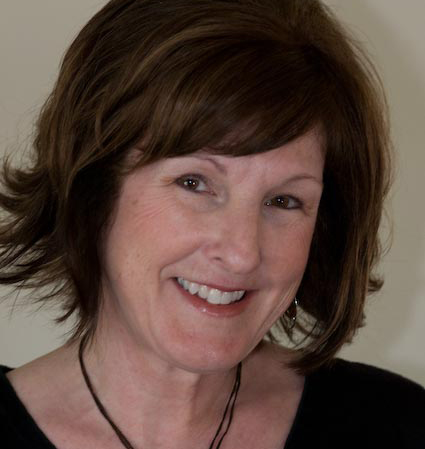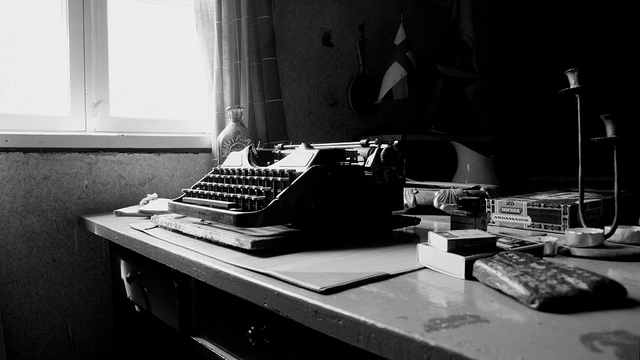Theme Essay by Virginia Foley
Not a Booze-Swilling Night Owl? You Can Fantasize
On my desk, a plain glass ashtray overflows with cigarette butts, smashed one after another, almost as frequently as I crash back the carriage return. A bottle of cheap Scotch rolls on its side, drained to the last drop. There’s a sour taste in my scorched mouth. The floor is strewn with discarded pages. I type furiously, into the night, random bouts of sleep interrupting my creative flow. I pound madly on the keys, cursing, crying, laughing. My fingers throb but my brain is aflame. I am relentless, persistent, and then, in one glorious moment, it’s over. I catch my breath. A brilliant manuscript, tightly bound, lies ready to be placed into the eager hands of a publisher.
This fantasy comes when I can’t release the words that hound me. It comes when my thoughts are jumbled and I’m ready to give up, when I believe someone far more fiery and adept than I would do a better job.
I’m daydreaming—and daydreaming is a big part of my writing process.
Daydreams might seem to eat up the minutes as well as any motivation to return to work, but I’ve found that they’re not a waste of time. There’s nothing wrong with imagining a different milieu from where I now write, as long as it doesn’t keep me from writing altogether. Daydreams can move me to new dimensions of release.
I haven’t had a cigarette between my lips since high school. On my well-organized desk, a coaster depicting a pastoral Scottish scene holds my usual mug of English breakfast tea. A square recycle bin stands neatly beside my printer. My floor is freshly vacuumed; the view out my window is of snow-capped mountains. I dip a freshly baked hazelnut biscotto into my tea and neatly tap on my laptop keys, turning out text that is all mine.
A daydream is extravagant imagination, arousing because it’s often unattainable. What we can’t or don’t have is almost always more appealing than the mundane. But acting on a fantasy can sometimes be disappointing; reality doesn’t always generate the titillation that fancy can. If cigarette ashes stained my typed pages, they would probably still contain my light and airy prose. Meanwhile, other writers may wistfully conjure my room-with-a-view in their own daydreams.
Many authors get stuck fantasizing about “if only I had this.” If only I had a better place to compose, a different view, a more crowded or a quieter environment, I’d be a better writer. If I used pen or pencil, lined paper or Moleskin notepads, the best computer money can buy—or if I were a purist and discarded electronics altogether—my words would meld harmoniously. If I used drugs or plied myself with booze, I’d free my thoughts into something that even I don’t recognize.
I’ve lived in different parts of the world, imagining every time that I’ll become a different writer because I’m somewhere new. I’ve believed I could take on a new persona, discover a different method of composing. I’ve searched for this new me under pebbles at a beach, on the tops of mountains, or hidden in cathedrals of pine trees. But while I find new topics, I don’t find a new writer. I still communicate from the same heart.
So why do I still let myself get caught in the classic writer’s fantasy of sweating it out in a darkened room, peppering myself with booze and cigarettes over a manual typewriter? Because sometimes fantasies, wild or absurd as they may seem, help to access an alternative reality. I need only escape for a few moments, and I’m able to tap into a set of emotions not found in my real world. When I need to dig deeper, get grittier, I imagine that smoke-filled room, the overflowing ashtray, the Olivetti.
Like a thief, I steal from that scene. I take what I need. My daydream becomes more than a momentary distraction; it’s a way to catapult me back to the world where I do write, treasure at hand.
It’s words, not Scotch, that intoxicate a writer’s soul. Words are the wild children we can’t control. But occasionally I need to dream about that fiery writer’s life—to taste and smell that passion—to get drunk on my own.
Guiltless Daydreaming for Writers
While it may feel like a fresh start to move from one writing location to the next, it can actually hinder the kind of daydreaming that sparks creative flow. Go ahead and fantasize—just don’t obsess about where you write.
Tip 1: Don’t Try to Control Your Writing Environment
The perfect physical environment won’t help, or at least it’s not enough. Don’t try to control where you write or obsessively tell yourself that your writing space isn’t good enough. Wonderful pieces of prose have been created in the prettiest rooms or the drabbest quarters. You may be sitting in a comfortable office chair, lounging on the grass, or composing on the commode.
Tip 2: Don’t Judge Yourself Too Harshly
Being lost in a reverie is not always a form of procrastination. Words appear when and where they want to, and the more you use them, the more insistent they become. They aren’t patient. They nag and pester, and when the creative flow gets going, they can be so demanding that it almost feels like a dream. It’s then that you need to stare out the window, cast those words into another place or time. Then haul them back and fit them into your own world, in your own way.
Tip 3: Be True to Yourself
Fantasies can produce short-lived exhilaration, but they can’t change the essence of who you are. Don’t discard your fantasies, just don’t expect too much of them. You don’t have to drink Scotch or smoke cigarettes. Really.
Art Information
- "Great Minds Only Need Simple Tools" © Antti; Creative Commons license.
 Virginia Foley is a Canadian freelance writer who currently resides under the Big Skies of Montana with her husband. She draws on her previous experiences of living in Canada, Scotland, Wisconsin, and the Caribbean, and has recently completed her first historical novel, which centers around Native American cultures and the relationships between tribes.
Virginia Foley is a Canadian freelance writer who currently resides under the Big Skies of Montana with her husband. She draws on her previous experiences of living in Canada, Scotland, Wisconsin, and the Caribbean, and has recently completed her first historical novel, which centers around Native American cultures and the relationships between tribes.
For more information, visit Virginia Foley’s website.

